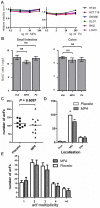Intestinal tumorigenesis is not affected by progesterone signaling in rodent models
- PMID: 21818351
- PMCID: PMC3144908
- DOI: 10.1371/journal.pone.0022620
Intestinal tumorigenesis is not affected by progesterone signaling in rodent models
Erratum in
-
Correction: Intestinal Tumorigenesis Is Not Affected by Progesterone Signaling in Rodent Models.PLoS One. 2013 Jun 5;8(6):10.1371/annotation/b60d4ec5-4c6f-43ab-9f63-322e3cd59636. doi: 10.1371/annotation/b60d4ec5-4c6f-43ab-9f63-322e3cd59636. eCollection 2013. PLoS One. 2013. PMID: 29294471 Free PMC article.
Abstract
Clinical data suggest that progestins have chemopreventive properties in the development of colorectal cancer. We set out to examine a potential protective effect of progestins and progesterone signaling on colon cancer development. In normal and neoplastic intestinal tissue, we found that the progesterone receptor (PR) is not expressed. Expression was confined to sporadic mesenchymal cells. To analyze the influence of systemic progesterone receptor signaling, we crossed mice that lacked the progesterone receptor (PRKO) to the Apc(Min/+) mouse, a model for spontaneous intestinal polyposis. PRKO-Apc(Min/+) mice exhibited no change in polyp number, size or localization compared to Apc(Min/+). To examine effects of progestins on the intestinal epithelium that are independent of the PR, we treated mice with MPA. We found no effects of either progesterone or MPA on gross intestinal morphology or epithelial proliferation. Also, in rats treated with MPA, injection with the carcinogen azoxymethane did not result in a difference in the number or size of aberrant crypt foci, a surrogate end-point for adenoma development. We conclude that expression of the progesterone receptor is limited to cells in the intestinal mesenchyme. We did not observe any effect of progesterone receptor signaling or of progestin treatment in rodent models of intestinal tumorigenesis.
Conflict of interest statement
Figures



Similar articles
-
Stromal Indian hedgehog signaling is required for intestinal adenoma formation in mice.Gastroenterology. 2015 Jan;148(1):170-180.e6. doi: 10.1053/j.gastro.2014.10.006. Epub 2014 Oct 13. Gastroenterology. 2015. PMID: 25307863
-
Intestinal epithelial cell-specific CD98 expression regulates tumorigenesis in Apc(Min/+) mice.Lab Invest. 2012 Aug;92(8):1203-12. doi: 10.1038/labinvest.2012.83. Epub 2012 May 28. Lab Invest. 2012. PMID: 22641098
-
MET Signaling Mediates Intestinal Crypt-Villus Development, Regeneration, and Adenoma Formation and Is Promoted by Stem Cell CD44 Isoforms.Gastroenterology. 2017 Oct;153(4):1040-1053.e4. doi: 10.1053/j.gastro.2017.07.008. Epub 2017 Jul 14. Gastroenterology. 2017. PMID: 28716720
-
Chromatin remodeling and control of cell proliferation by progestins via cross talk of progesterone receptor with the estrogen receptors and kinase signaling pathways.Ann N Y Acad Sci. 2006 Nov;1089:59-72. doi: 10.1196/annals.1386.025. Ann N Y Acad Sci. 2006. PMID: 17261755 Review.
-
Vitamin D and the nutritional environment in functions of intestinal stem cells: Implications for tumorigenesis and prevention.J Steroid Biochem Mol Biol. 2020 Apr;198:105556. doi: 10.1016/j.jsbmb.2019.105556. Epub 2019 Nov 26. J Steroid Biochem Mol Biol. 2020. PMID: 31783155 Free PMC article. Review.
Cited by
-
Grp78 is required for intestinal Kras-dependent glycolysis proliferation and adenomagenesis.Life Sci Alliance. 2023 Aug 29;6(11):e202301912. doi: 10.26508/lsa.202301912. Print 2023 Nov. Life Sci Alliance. 2023. PMID: 37643866 Free PMC article.
-
Induction of endoplasmic reticulum stress by deletion of Grp78 depletes Apc mutant intestinal epithelial stem cells.Oncogene. 2017 Jun 15;36(24):3397-3405. doi: 10.1038/onc.2016.326. Epub 2016 Nov 7. Oncogene. 2017. PMID: 27819675 Free PMC article.
-
Prognostic value of estrogen receptor-α and progesterone receptor in curatively resected colorectal cancer: a retrospective analysis with independent validations.BMC Cancer. 2019 Oct 7;19(1):933. doi: 10.1186/s12885-019-5918-4. BMC Cancer. 2019. PMID: 31590647 Free PMC article.
-
Therapeutic Strategies and Potential Actions of Female Sex Steroid Hormones and Their Receptors in Colon Cancer Based on Preclinical Studies.Life (Basel). 2022 Apr 18;12(4):605. doi: 10.3390/life12040605. Life (Basel). 2022. PMID: 35455096 Free PMC article. Review.
-
Estradiol and progesterone regulate proliferation and apoptosis in colon cancer.Endocr Connect. 2019 Mar 1;8(3):217-229. doi: 10.1530/EC-18-0374. Endocr Connect. 2019. PMID: 30738018 Free PMC article.
References
-
- Anderson GL, Limacher M, Assaf AR, Bassford T, Beresford SA, et al. Effects of conjugated equine estrogen in postmenopausal women with hysterectomy: the Women's Health Initiative randomized controlled trial. JAMA. 2004;291:1701–1712. - PubMed
-
- Rossouw JE, Anderson GL, Prentice RL, LaCroix AZ, Kooperberg C, et al. Risks and benefits of estrogen plus progestin in healthy postmenopausal women: principal results From the Women's Health Initiative randomized controlled trial. JAMA. 2002;288:321–333. - PubMed
-
- Chlebowski RT, Wactawski-Wende J, Ritenbaugh C, Hubbell FA, Ascensao J, et al. Estrogen plus progestin and colorectal cancer in postmenopausal women. N Engl J Med. 2004;350:991–1004. - PubMed
-
- Half E, Arber N. Colon cancer: preventive agents and the present status of chemoprevention. Expert Opin Pharmacother. 2009;10:211–219. - PubMed
Publication types
MeSH terms
Substances
LinkOut - more resources
Full Text Sources
Molecular Biology Databases
Research Materials
Miscellaneous

